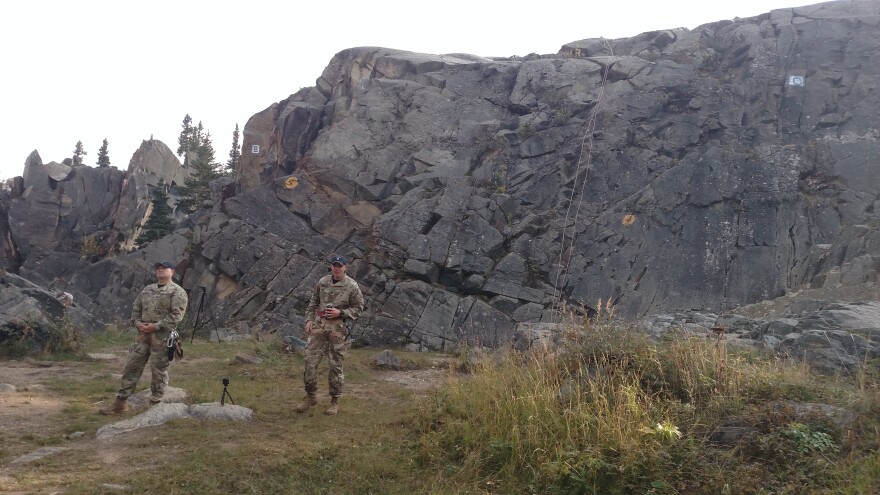A half-dozen soldiers from Uzbekistan spent five days last month training with their American counterparts at the Army’s Northern Warfare Training Center at Black Rapids. The two-way training was intended to enable the soldiers to exchange ideas about military mountaineering – and to help build relations with the Central Asian nation.
A dozen or so U.S. and Uzbekistani soldiers gather at the base of a 50-foot rock face at the Northern Warfare Training Center, donning their protective gear in preparation for a few hours of instruction on advanced rappelling techniques.
One of the U.S. trainers, Staff Sgt. Nathan Barrick, checks his mountaineering gear before heading up to the top of the hill.
“Here I have a couple of lockers – couple of large locking pairs,” he said. “Non-lockers. I have some cordelette here …”
The Uzbekistanis had flown-in to Fairbanks a couple of days earlier after a series of flights from their central Asian nation that included the usual long delays at O’Hare International. They began their training Aug. 26 at Black Rapids, located in the eastern reach of the Alaska Range about 40 miles south of Fort Greely.
Their interpreter, Jahangir Haitov, says the six soldiers he was translating for appreciated the chance to come here for some military mountaineering training with the Americans.

“This is our first visit to Alaska,” he said, “and we’re so grateful to the leadership of Fort (Wainwright) for inviting us.”
Master Sgt. Mario Colon accompanied the Uzbekistanis. Colon is assigned to the Army component of the U.S. Central Command headquartered at Shaw Air Force Base in South Carolina. He says the training is intended to benefit both the Uzbekistanis and the Americans.
“It’s totally two-way,” he said, “so, as they learn from us, there might be some stuff that we also learn from them.”
Barrick agrees, adding: “Because they’re advanced mountaineers, where they come from. And we’re advanced mountaineers.”
He says they’ve already picked up some pointers from the Uzbekistanis.

“Last night,” he said, “they showed us a couple of techniques that they would use in the event of a combat scenario to be able to still utilize their weapon. Something I never even thought about.”
That something was the Uzbeks’ technique of fashioning a sling out of rope or strap that’s worn by four soldiers as they’re moving an injured fellow soldier on a stretcher. The set-up allows the troops doing the rescue to have both hands free to use a weapon or other equipment, as needed.
“They brought it up and they showed us and it was amazing that the system that they developed is perfect,” Barrick said. “Very simple.”
A few minutes later, the soldiers practiced that technique and others after hiking to the top of the hill, where Staff Sgt. Ryan Retzner, a senior instructor, was lecturing, and Haitov was interpreting.
“Maybe they have an arm injury and they can’t rappel,” he said, during a demonstration on methods to rappel with an injured or wounded soldier on his back. “… Or maybe they have lost their ATC,” a piece of mountaineering gear needed to rappel.
Haitov then interprets Retzner’s instructions into Uzbek, and then relates them to the Uzbekistani soldiers.
Haitov says the U.S. military has been working with Uzbekistan for about 20 years, and a U.S. Army Alaska spokesperson says the Uzbeks were invited to train at Black Rapids because the United States considers Uzbekistan a friendly nation.
The Uzbeks certainly seemed friendly, judging by the laughter that erupted from them from time to time. Like when one of them asked Retzner if he could stop midway down the rock face for a coffee break.
The soldier shouted to his comrades, and Haitov, translated for the Americans: “He wants to have coffee!” As the interpreter explains the soldier’s request, all of the soldiers erupt in laughter.
Or a few minutes later, when one of the Uzbeks pretended to be afraid as he was about to begin rappelling.
“Help me! Help me!” the soldier cried out in a meek voice, again drawing a round of guffaws from the soldiers at the top of the rock face.
The camaraderie seemed to help the two groups of soldiers overcome the language barrier that kept them from interacting much. After a while, it didn’t seem to matter much that the visiting soldiers were speaking in a different language. Both they and the Americans were joking and laughing, sometimes with the interpreters, sometimes without, as they all waited for their turn to rappel.
They seemed to be communicating amongst themselves, somehow – maybe in a sort of common language that’s known by soldiers everywhere.
Correction: This story was revised to correct the spelling of Staff Sgt. Nathan Barrick's name.



